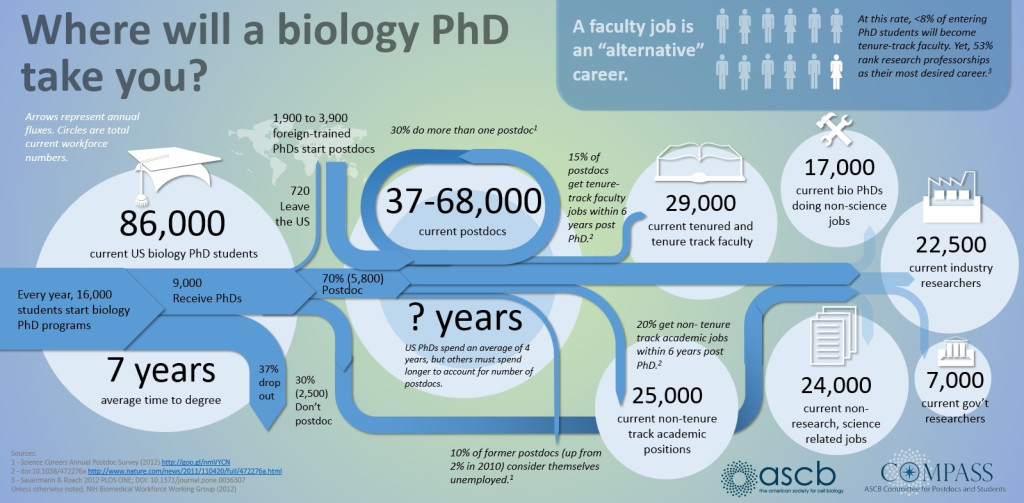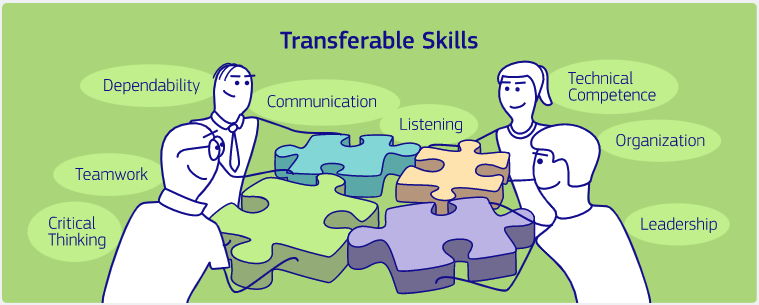By Gina Sanchez
PhD candidates often concern themselves over what a job in industry might look like. Images of high-tech labs are both exciting and frightening as a new adventure awaits. The reference for many of our experiences in industry are large pharmaceutical companies, such as Merck or Pfizer, or sometimes start-ups. Samantha Avina recently wrote an article detailing an Industry Career Panel hosted by iJOBS as well. But we often do not consider the mid-sized companies. As more PhDs begin to choose a career outside of academia, we must begin to expand our horizons. Luckily, iJOBS hosted a career panel of Rutgers alumni who now work in mid-sized pharmaceutical companies in order to broaden our scope for our upcoming career searches.

Trajectory of PhD students in 2015, Ryan Raver of
http://thegradstudentway.com/blog/?p=2153
The panel began with short introductions by our four panelists: Dr. Csanad Gurdon, Senior Scientist at AeroFarms; Dr. Eric Himelman, Non-Clinical Research Scientist at Ultragenyx Pharmaceuticals; Dr. Praveen Bommareddy, Associate Director of Research at Replimune; and Dr. Jimin Zhang, Assistant Principal Scientist at Insmed.
For the first topic, the panelists discussed how they got into their current career. Dr. Gurdon had done both his PhD and post-doctoral fellowship at Rutgers University, and began the application process at the end of his post-doc. He knew that he enjoyed teaching, but did not want to write grants, and that he did have most of the qualifications for a senior scientist, a subject-matter expert generally with a graduate degree that oversees research and develops projects. In this position he still writes grants, but mostly Small Business Innovation Research (SBIR) grants. Additionally, he credited SciPhD for many of his transferrable business skills, which are critical for small-to-mid-size pharmaceutical companies. Such skills include project management, communication/ability to work within a team, and effective time management. Dr. Himelman was a bit different in that he chose a company that would essentially allow him to continue working on the topic that he had focused on during both his PhD and post-doctoral fellowship at Rutgers, muscular dystrophy. It is worth mentioning that he applied during COVID-19 and is already in a leadership position making hiring decisions for his team. Dr. Bommareddy utilized the iJOBS program during his PhD at Rutgers to do an internship at Regeneron, gaining experience in a larger pharmaceutical company. He realized that the idea of watching a company grow from within was something that he wanted, which led him to join Replimune, which is a now clinical-stage biotech company. Dr. Zhang completed his PhD at Rutgers and began his post-doctoral training shortly afterwards, but due to a funding issue, decided to move to an industry post-doc at Insmed. As with many post-doctoral fellowships in industry, he was told that the training would be for one year and upon success, he could be offered a permanent position. As demonstrated by the panelists, there are many ways to transition into a mid-sized industry company.

A graphical listing of various transferrable skills in the workplace, courtesy of https://mrsimon.ai/transferable-skills-and-your-next-job/
You may be wondering what would be expected of you in a mid-sized company compared to a larger one. Dr. Gurdon first advised that neither is better than the other, but rather, it is up to the individual. He emphasized that it is essential to “note your transferrable skills,” such as project management. We have all been sub-consciously honing our project management abilities just by working on our theses for the past several years! This is essential in any job that you may choose after completing your PhD, but it is critical in a mid-size company. Dr. Himelman and Dr. Bommareddy were able to speak to the importance of project management, as they now manage several teams and must coordinate between them. Dr. Himelman is currently in the transitionary phase as he is building his own team; so similar to a new PI, he is mentoring new scientists so that they can help optimize techniques and teach future members, allowing him to work more on the business side of things. On the other hand, Dr. Bommareddy must coordinate between pre-clinical translational and clinical translational teams – including 15 distinct labs – to compile results and assess feasibility between groups. Dr. Zhang also chimed in, mentioning that “in a small company, you must wear many hats” at the same time in order to effectively do your job.
Finally, the panelists shared some over-arching application advice. First, Dr. Gurdon advocated for doing informational interviews with companies, especially if you are looking to obtain as much information as you can about a title or field. He also advised using your network to your advantage when applying for a job. Dr. Himelman warned us that interviewers are likely to ask you to explain various skills that you note in your resumé to make sure that you actually understand the technique/skill. He also said that you should ask questions that get at the experiences of the interviewer so that you can connect on a more personal level. When he is interviewing candidates, he stated that he looks for someone who he could get along with (since you will be around each other 40+ hours every week) and that he likes people who ask questions, demonstrating that the individual is not just complacent with what they already know. Importantly, he stated that you do not need to have every skill that the employers want, just emphasize what you do know and do not approach it as a deficit. Overall, the panelists agreed that you should tell the recruiter what you will contribute, instead of asking them what you can contribute.
From this panel, students were able to gain valuable insight into what it is like to work in a mid-sized pharmaceutical company. Employees have more creative freedom and often have to wear more hats in a mid-sized company compared to one of the larger pharmaceutical companies. Many skills that we learn during our PhD and post-doctoral training would leave us well-suited for this career path.
This article was edited by Junior Editor Zachary Fritz and Senior Editor Brianna Alexander.